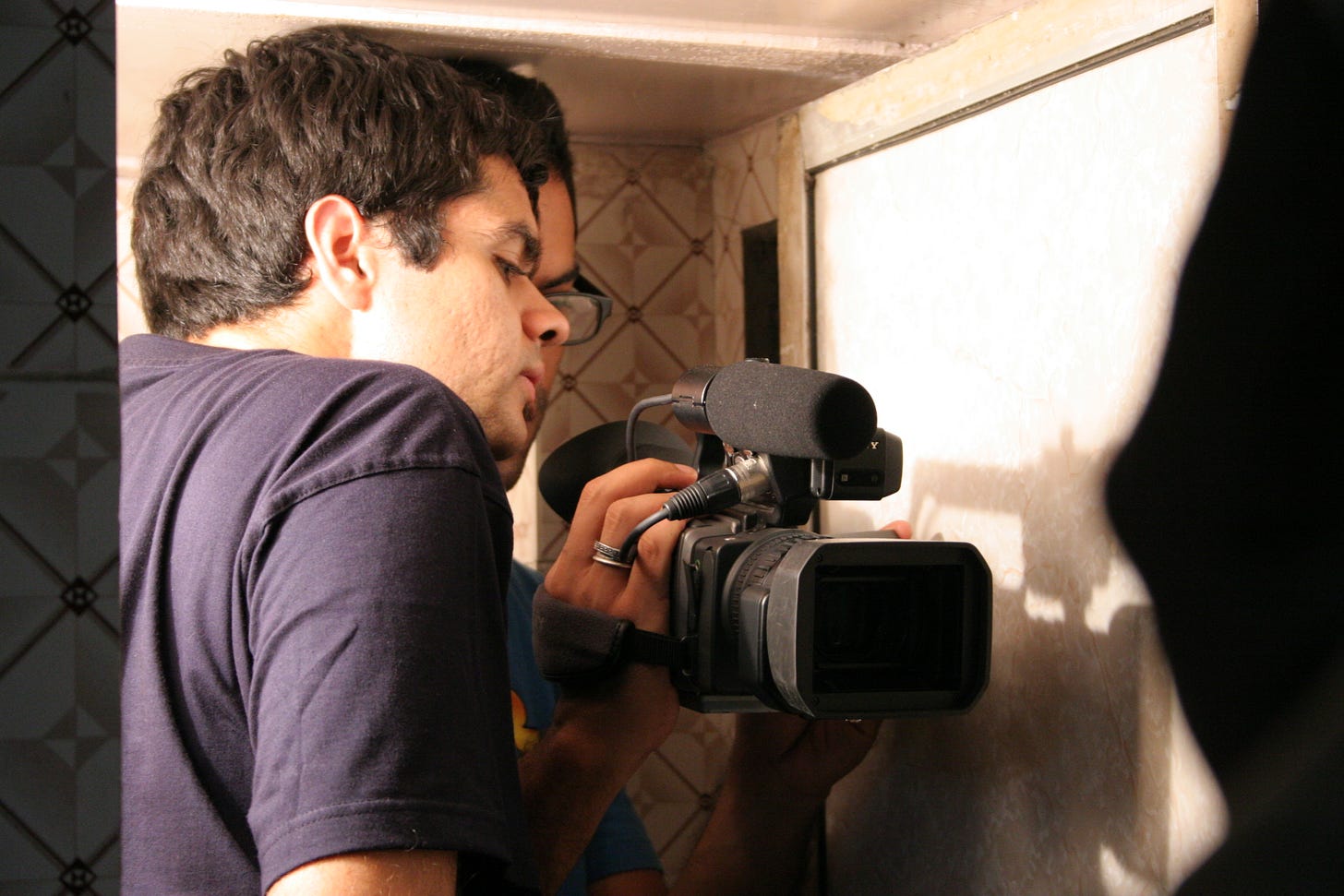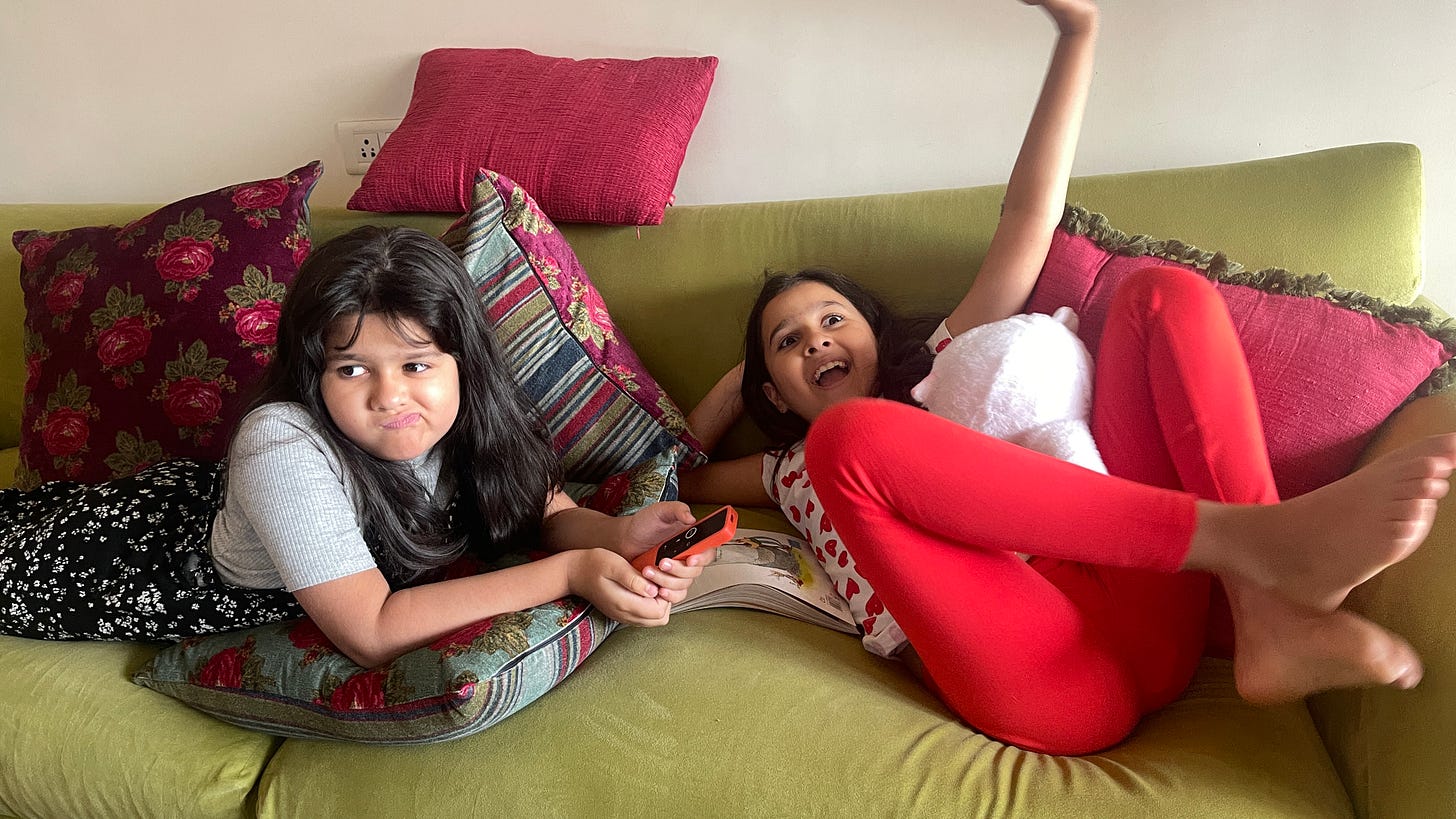Greetings!
If you’ve been on stage, then you know this feeling.
It begins in the pit of your stomach - a tightness that doesn’t let you stand tall, that sucks your shoulders down towards it. It enfeebles your voice, makes your stride small, makes you feel little.
In my memory, in this condition I felt cold.
Then, you find yourselves standing illuminated by the lights - after that, your shoulders straighten, and a voice comes as if from nowhere and starts to exit your lips like someone else’s voice - all the tightness in the stomach translates into energy, as if matter and antimatter had met and imploded somewhere in the vicinity of your centre of gravity.
In my memory, in this condition I felt hot, as if all those preceding feelings had become the firewood for that performance that had fallen to my charge.
Greetings dear Yet Untitlers
It’s no coincidence that I’m writing about stage-fright this week. Last week, I ‘came out’ with ‘Yet Untitled’ on Instagram, after having spent 19 weeks painstakingly growing a subscriber base of about a 100, literally one reader at a time.
It was slow. It was controlled. But all the while was a looming question - could I (should I?) get YU though to more readers? How? Putting it out there for a wider audience to take it or leave it seemed to be the way forward. But ah, there as the caveat of what if (insert your own “vulnerable person’s list of worst nightmares”; mine includes being told I’m crap by someone I respect).
But I still went ahead and finally did it - posted the damn thing on the Instagram. It wasn’t as bad as I thought - the feeling to follow was almost celebratory, coupled with relief and anticipation. Over the next 24 hours (while the Insta-story was live), I received a grand total of TWO new subscriptions (a 👋🏼 to you both!).
The quantum of the harvest aside, I think that stepping across the line onto a bigger stage was important. I know this from my Buddhist practice.
In Buddhism, the concept of enlightenment is also described as breaking away from the limitations of one’s ‘lesser self’ (the ego; the identity we answer to) by manifesting our ‘greater self’ (our innate Buddhahood, the pinnacle life-state present in all life). According to Buddhism, what stands in the way when we make the journey between these two selves is Delusion, also called Fundamental Ignorance, often characterised by fear and its accompanying life-conditions.
Hence, stage fright felt like a great metaphor for the purposes of this edition.
Making yourself vulnerable
This current heat wave in India made me realise how vulnerable we are, all the time. One little tip in Mother Nature’s fragile balance, and we find our lives upturned. There’s no limit to how far this can go - but walls, cars, civilisation, Netflix - all dupe us into believing that everything will stay just fine.
We’re all vulnerable as shit. So perhaps it isn’t a bad thing to feel it - to know it - once in awhile.
There are few things other than acting that have given me as visceral an experience of vulnerability.
Once - as a pre-pubescent boy whose voice hadn’t broken - I played a woman on stage before a mostly male audience at my all-boy boarding school. It was a production of Girish Karnad’s Tughlaq. Picture me - in a green salwar suit - waiting to walk on before an audience of 500 adolescent boys, all waiting to hoot and jeer at me.
But I still walked on.
I’ve been thinking about what gave me the strength to do it, and I can’t remember anything in particular except thinking to myself “someone had to do it”. Another thing I remember is that once I was on stage, at some point, the jeers stopped and a silence descended on the amphitheatre. Perhaps the boys in the audience had forgotten about me as a target for a moment, and instead had been drawn in to the play - which was a powerful examination of Tughlaq’s mad genius. Perhaps - though they would never admit it (the macho-ness of boarding school culture will always stand in their way) - they were were paying attention to the strong woman I was channeling.
Was this of any use to them? I don’t know. Was it of any use to me?
Today - an all-woman producer team has entrusted the writing of their female-led coming-of-age episodic drama to me. There’s trust also from from the commissioning team and my co-writer - all lovely, smart, strong women.
Was getting past that stage-fright of any use to me? I would say so!
Man on wire
I believe that something happens when we are brave. I think that the world around us ends up changed by bravery. Bravery, not hollow bravado.
Just listen to the responses of people who had watched Philippe Petit walk on a wire between the Twin Towers, recorded so beautifully in James Marsh’s 2008 documentary Man on Wire. It was a moment of awe, of connection - a profound event in the lives of all those who had watched him. Imagine, these people teared up thinking about it decades later. After I saw this in the documentary, ‘Man on Wire’ became my reference point for the transformative power of bravery.
Why are we in awe when someone is brave? I think part of it has to do with our own disbelief at ourselves, at our own inability to be brave. However, I think that the awe comes from somewhere else. I think a tiny part of us recognises our ability to be brave as well. I think the awe is in recognition. And the tears are of relief. Thank God this ability exists in humanity.
“Maybe we have a bloody chance after all”.
Here’s a nice song for you, affirming the same:
What we learn from first films
My first film - Shanu Taxi - even though it was a short, was a song to make. Everything came together so beautifully, and I enjoyed it; because I really had nothing to lose. Stage-fright didn’t really kick in so much. If I failed, well, it’d suck but things wouldn’t end up changing so much.
Ask any director about second films. The experience usually sucks, because suddenly you have everything to lose! I was really walking on egg-shells during my second short ‘Sukrit’s Sundays’; and was a total wreck while filming ‘Sebastian And Rose’, my last short. It felt as if the stakes just kept mounting.
Would recreating that same, free feeling of having nothing to lose equate to what’s referred to as ‘beginner’s mind’?
Whatever it is, that’s how I want to live.
I wonder what stands in my way?
Validation
Validation’s big. In Steve James’ documentary on the life of the prolific film-critic Roger Ebert (one of the most moving docs I’ve seen, available on MUBI if you have it), Martin Scorsese talks about what it meant for Ebert (and his partner Siskel) to have given him validation at what was probably his lowest point as a human being.
It saved Scorsese’s life.
Yes, I believe that validation can save your life. But validation alone is, I think overrated - in the sense that we come to rely on it too much and get a bit bratty when it doesn’t come.
Let me speak for myself and say it - I get cranky when validation doesn’t come. I also get paranoid and unsure of myself. But, I can also tell you that having failed multiple times and still being around often makes me the most confident person in the room from who the clearest decisions come.
Still. Failure, when you meet it - usually sucks. It takes gumption to ride failure without wincing. Hence, in any arena where I may win or lose - I experience stage-fright before stepping in.
There are various scenarios that give me the heebie-jeebies when I think about them - a little shudder wondering whether I fail or prevail. Let me confess one to one of these: I’m quite petrified at the prospect of raising young adults! I want my twins to remain 8! What will I do when the hormones assault?
Ananya and Aahana don't seem too worried!\
Rites of passage
Seems like stage-fright’s a given.
In this our world, there’s much to be anxious about. However, I don’t believe this to be a modern predicament. In rituals around the Rite of Passage, one of the most important lessons imparted to a youth when they came of age was that “life is going to be full of challenges that frighten you”. However, it seems to me that these rituals were designed to also instruct the youth not to be frightened.
Pixar’s ‘Finding Nemo’ has moved me in so many ways over the years. Nemo’s rite of passage scene in the fish tank is one of my favourites. Nemo’s a little baby wish with a stunted fin who been separated from his dad - his only living parent: thus he's not the most confident of them all. To counter his fear, his new friends stage this rite of passage ritual:
Ultimately, Nemo’s asked to swim through a flurry of bubbles, something he can do easily, but he isn’t told this. His friends (elders?) psyche him up, urging him to accept the challenge, reassuring him quietly that he can do it. Nemo swims across the bubbles, and he’s essentially reborn - braver than before.
We may live in a first world country with functioning systems, but ultimately it’s this social fabric made up of elders and peers - the ones who have seen, experienced, maybe even failed and stood up again - who can get us past the flurry of stage fright onto the things we need to do to feel fulfilled and happy.
For Ananya and Aahana, this is the world I wish for. I’ll start building it by encouraging the person in front of me. Perhaps, stepping into the light together, we won’t be so frightened.
Thanks for reading and see you next week!
V
PS: What’s your experience with stage-fright?
Tell me.
I want to know!





